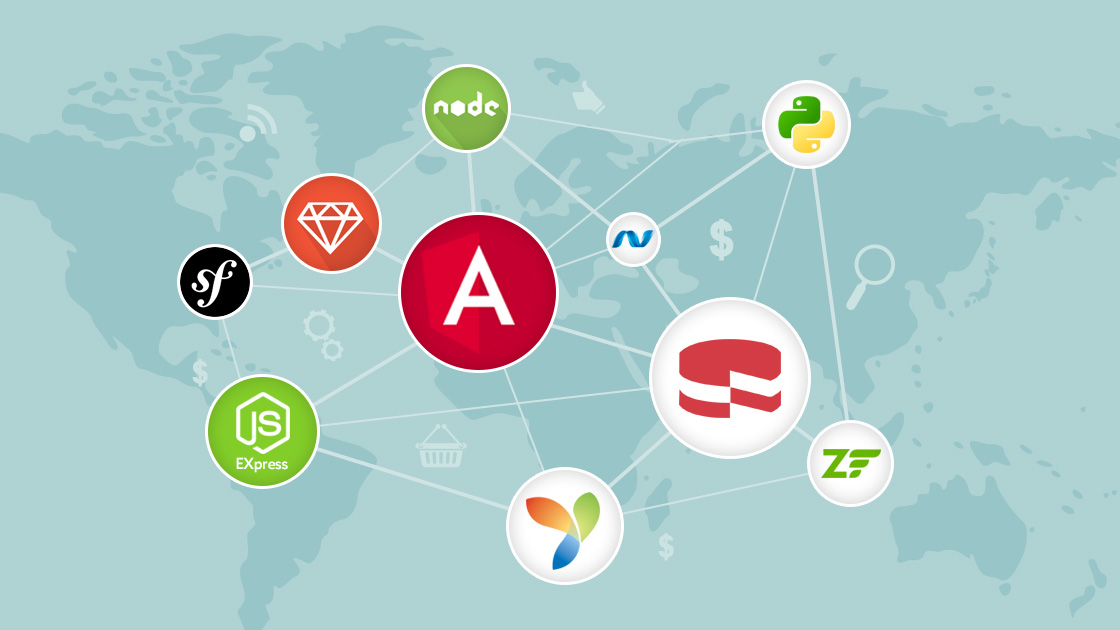Recent post
Subscribe to the Blog
Get our research-based blogs and stories delivered to your inbox.

Developing robust web applications requires plenty of hard work and dedication. But, it can be difficult to make smart decisions about which tools you’re going to use on your project, especially if it’s your first time working with that framework or technology. Here are ten of the best web development frameworks that will take your project to the next level and help you complete your mission more quickly and efficiently. I recommend taking notes!
Vue.js is a progressive framework that builds on ideas of earlier frameworks. One of the key ideas is to provide data reactivity so that the user interface updates as the underlying data changes. It also implements a unidirectional data flow which helps create more predictable, understandable and maintainable code.
Aurelia is a great web development framework for building high-quality, customizable user experiences. Aurelia provides a rich UI component system and handles the low-level tasks required to display the app on a browser such as a layout, animation, and state management.
ReactJS is a JavaScript library built by Facebook as an alternative to using other web application development frameworks. It helps developers design scalable, fast and easy-to-manage user interfaces and there are many dedicated ReactJS app development company you can hire for your business app development.
– Angular is a front-end, open-source framework for web app development. It was created by Google, but it’s now an MIT and Apache Software Foundation project.
– In Angular, all the programming is done in TypeScript. All code you write needs to be run through a transpiler (the Angular compiler) before it can work in the browser.
– You have to download and install Node first before installing any of the other dependencies needed by Angular.
Ember.js is a JavaScript framework that allows the creation of interactive websites that are built on JavaScript, HTML, and CSS. It was originally developed by Yehuda Katz and released in 2011 as a tool to assist with building large web applications. When paired with an Ember data library, the application becomes more advanced because of its seamless integration between these elements. Ember makes use of Handlebars as its templating engine which includes components known as widgets used for specific tasks.
Ruby on Rails is a cross-platform web application framework, with Ruby as its programming language. It includes everything needed to create dynamic websites and web applications: an object-oriented web framework, an agile methodology and a set of ready-to-use libraries. Some noteworthy projects that are built using the Ruby on Rails framework are Basecamp, GitHub and Shopify. You can hire Ruby on Rails developers to help you develop your idea. With the help of Ruby on Rails developers, you will have a more robust website or web application in no time.
Python-based Django is an open-source web framework. Django has been designed with the needs of web development in mind, and as such does not make any assumptions about what a user might want to do with their data. Unlike many other frameworks, which require information upfront about how various elements will be used, Django encourages users to build websites as living products that can evolve to meet new needs and requirements over time.
With its expressive, elegant syntax, Laravel is a popular framework for developing web applications. Beginners will find it easy to use, and experts will find it powerful. Laravel uses a built-in Templating engine as well as auto-routing (determine where the request should go when a user visits a URL) that are of help in simplifying the development process.
Durandal is a framework that was originally developed by Progressive Media. With it, you will be able to develop rich single-page applications using JavaScript and HTML.
Mithril is a fast, minimal, modern framework for building Single Page Applications with JavaScript. Mithril does not have as many plug-ins and components as some of the more well-known frameworks such as React and Vue. But instead, it does include what many consider to be the most important features that any framework should provide: strong templating, composable view components, a clean code base and an unopinionated approach.
CodeIgniter is a fast, secure and user-friendly PHP web application framework. CodeIgniter is designed for developing websites with minimal effort.
It uses a simple format consisting of functions. A number of these functions are available in the core library, while others can be found in third-party libraries that integrate into the CodeIgniter framework. CodeIgniter provides an Active Record implementation to access data stored within a database. Code Igniter is scalable, secure and simple to use. Plus it has some other fantastic features like MVC support, RESTful routes and parameterized queries for simpler form handling.
jQuery is a JavaScript library that simplifies many aspects of traditional HTML, allowing users to interact with the page and change its appearance in response to user input. jQuery’s developers provide a selector engine, and methods for handling events, animations, effects, etc. By following the library’s conventions for selecting elements on a web page and attaching event handlers that specify what should happen when those elements are accessed or modified via user interaction with them. jQuery handles all of the low-level cross-browser incompatibilities among browsers as well. This makes it popular among amateur programmers who are new to web development and inexperienced programmers seeking quick solutions.
CherryPy is a fast, lightweight framework with support for object-oriented programming. It features a built-in HTTP server and can be used to serve dynamic content such as web pages or standalone scripts. CherryPy is an excellent choice if you need to build web applications that are lean and require very little in the way of infrastructure to get up and running. Additionally, there’s no required external database — your application needs are handled within the framework itself. If you’re looking for a powerful but easy-to-use framework, this might be the one for you.
In this section, we will take a look at the Grails framework. Built on the Java Virtual Machine, this lightweight framework is written using Groovy as its scripting language and helps with rapid application development. It also provides many utilities that are commonly needed in development environments, and it’s designed to be powerful yet easy to learn and use.
Get our research-based blogs and stories delivered to your inbox.
 Top Mobile App Development Firms
Top Mobile App Development Firms
 Top Web Development Firms
Top Web Development Firms
 Top On Demand App Developers Firms
Top On Demand App Developers Firms